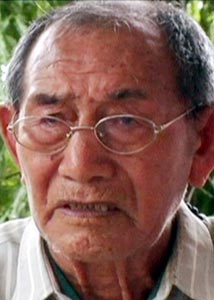Name: Jampa Tashi
(Alias: No)
Gender: Male
Interview Age: 83
Date of Birth: 1924
Birthplace: Repa Lungpa, Kham, Tibet
Year Left Tibet: 1959
Profession: Monk
Monk/Nun: Previously
Political Prisoner: No

Interview No.: 3
Date: 2007-06-25
Language: Tibetan
Location: Lugsung Samdupling Settlement, Bylakuppe, Karnataka, India
Categories: Resistance and Revolution
Keywords: Chinese army -- invasion by , Chushi Gangdrug guerrillas, Dalai Lama -- escape, Kham, March 10th Uprising, monastic life, Norbulingka -- defense of, refugee in India -- life as
Summary:
Jampa Tashi is from Markham in eastern Tibet. He became a monk at the insistence of his parents and enrolled in a monastery in his village. Later, he left the monastery, went to Central Tibet and engaged in business until the Chinese occupation of Lhasa in 1959.
Jampa Tashi personally witnessed the events at Norbulingka in Lhasa on March 10, 1959 when the Chinese used artillery shells to suppress the Tibetan uprising. He was one of the volunteers who gathered to guard His Holiness the Dalai Lama. He saw the dead bodies of men and horses lying around Norbulingka during the uprising. On his escape to India he joined up with a group of Chushi Gangdrug guerrillas.
In India Jampa Tashi was sent to Simla to work on road construction. Life was hard and the climate was harsh. Later, he came to Bylakuppe when the settlement project started. Initially, life was very difficult as the place was a thick jungle. He and other Tibetans cleared the jungle, built roads and made a place for other Tibetan refugees who followed.
Interview Team:
- Rebecca Novick (Interviewer)
- Ronny Novick (Videographer)
- Tsering Dorjee (Interpreter)

